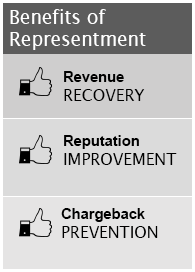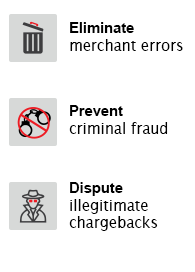
Representment Recovers Lost Revenue and Improves the Merchant’s Reputation
Chargeback representment gives the merchant the ability to dispute a chargeback filed by a consumer. The process serves many purposes, including recouping revenue and preventing future transaction disputes.
Why Dispute the Chargeback?
Merchants faced with a chargeback can either dispute or accept the revenue loss.
Many times, a merchant only considers a cost versus benefit analysis. What ROI opportunities are available? Will the amount of money recovered exceed the cost of the representment process?
 Because a chargeback dispute might not offer enough ROI, merchants are often tempted to simply accept chargebacks as a cost of doing business. However, there is much more to consider than short-term gains.
Because a chargeback dispute might not offer enough ROI, merchants are often tempted to simply accept chargebacks as a cost of doing business. However, there is much more to consider than short-term gains.
When chargebacks are filed, issuing banks assume merchants are guilty of wronging the consumer. After all, innocent merchants victimized by friendly fraudsters would defend themselves. Merchants validate this inaccurate opinion by simply accepting the chargeback without a fight.
The next time a chargeback is filed against that particular merchant, the issuing bank readily agrees to honor the consumer’s request. Because the merchant was ‘guilty’ the last time, the merchant must be guilty this time too. Less due diligence is executed and the consumer’s inaccurate claims aren’t exposed.
The business experiences more and more friendly fraud chargebacks because of the black marks on the merchant’s reputation.
Therefore, the long-term gains of chargeback representment far exceed any potential short-term losses or low ROI.
Understanding Representment
Representment is a right granted to merchants. When chargebacks are filed, merchants have the chance to defend their innocence. Considering the long-term effect on the merchant’s reputation and bottom line, the process should be handled with the upmost care.
 There are only three sources of chargebacks: merchant error, criminal fraud and friendly fraud. Usually, representment is only an option in cases of friendly fraud. A consumer shouldn’t be held responsible for true criminal acts or errors committed by the merchant.
There are only three sources of chargebacks: merchant error, criminal fraud and friendly fraud. Usually, representment is only an option in cases of friendly fraud. A consumer shouldn’t be held responsible for true criminal acts or errors committed by the merchant.
To successfully dispute a chargeback, the merchant must create a strong defense. Representment is completely depended on documentation, and the merchant must provide the necessary paperwork to validate the original transaction.
A professional chargeback rebuttal letter must be accompanied by applicable compelling evidence. Each chargeback reason code lists the appropriate documents that merchants can use to dispute the case.
Friendly fraud (fraud that is not criminal nor is not the result of a merchant error) should always be dealt with quickly. A chargeback dispute must be filed within 5-10 days; disputes that are submitted after the deadline won’t be considered.
Fight to Win
Chargeback disputes can be costly, sacrificing both time and money. Merchants can improve their odds of winning, thereby retaining valuable resources, by adhering to these key points.
- Know what is expected. Merchants need to stay informed about changes to the networks’ regulations, the steps involved in the representment process, and the timeline for handling a dispute.
- Document properly. Maintaining a workable system for filing (and finding) key pieces of evidence is essential to winning a chargeback representment. Establish a process for documenting important stages of the transaction, and train employees to use the process as well.
- Know the codes. Chargeback reason codes vary according to the network involved in the dispute. Merchants need to be aware of the specific chargeback reason code being cited in the dispute, and address that particular reasoning in the representment.
- Write a rebuttal. Disputes must be addressed in writing and must include specific details regarding the transaction in question. A professional, straightforward letter is an integral part of the chargeback dispute.
- Fight to win. The goal of the chargeback representment is to win the dispute, returning revenue to the merchant. The cost of representment increases dramatically if a second chargeback is issued. Merchants need to create the most compelling argument possible and successfully refute the cardholder with the first attempt.
- Avoid automation. Many merchants elect to take advantage of automated versions of the representment process. Unfortunately, automatic systems are unable to detect errors or glitches in the process, rendering their capabilities useless.
- Develop relationships with the banks. Issuing banks have specific requirements that they look for in winning chargeback disputes. Finding out what a successful dispute looks like can help the merchant follow its example.
- Study data reports. Understanding patterns and risks will help develop future safeguards for chargebacks.
- Know when to get professional help. Unfortunately, DIY chargeback management efforts aren’t always effective. In fact, merchants are usually only successful in the easy-to-win cases. A professional can help ensure representment effectively recoups revenue and enhances the merchant’s reputation at the issuing bank level. Several professional options are available, whether the merchant wants to outsource the entire task or simply receive on-demand assistance.
Representment Challenges
Representment is not without its drawbacks. Merchants who attempt to manage the process on their own often end up frustrated with their limited success. The challenges of DIY chargeback representment may include:
- The time committed to writing rebuttal letters and compiling the necessary documentation takes away from the merchant’s ability to effectively run the daily operation of the business.
- The complex, detailed information surrounding the chargeback process may be more than the merchant can fully comprehend.
- As technology’s reach expands, the tactics of criminal and fraudulent individuals change as well. Merchants are unable to stay ahead of the curve.
- Overly-aggressive techniques may cause more harm than good.
Winning chargeback disputes is possible. Knowing the process, presenting compelling evidence and establishing working relationships with issuing banks are all key to obtaining success.
Returning revenue to the merchant, improving the bottom line and protecting the merchant’s payment processing abilities are all important results of winning the chargeback dispute.
